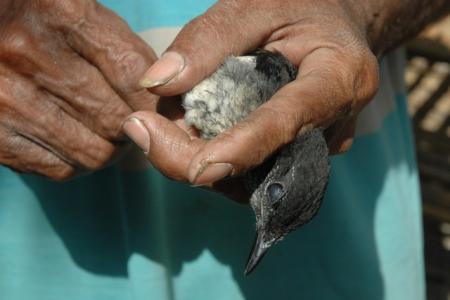Thousands Birds from Borneo Illegally ‘Flied’ on Motorboats
East Java Nature Conservation Agency (Balai Besar Konservasi Sumber Daya Alam / BKSDA) thwarted a smuggling attempt of 2,711 songbirds from Balikpapan, East Borneo. The smuggling was foiled at Tanjung Perak Seaport, Surabaya on Thursday (3/12/2015).
The head of BKSDA, Suyatno Sukandar, explained that the successful operation began when the authorities received a report on birds that were about to be sold in Jakarta and East Java from some passengers of KM Mahkota Nusantara ship. The birds were carried in carton boxes, loaded to a truck (plate number L 9678 UT).
Among the birds are 1,411 Greated Green Leaf-birds (Chloropsis sonnerati), 712 White-rumped Shamas (Copsychus malabaricus), 557 Commong Hill Mynas (Gracula religios), 20 Australasian Bushlarks (Mirafra javanica), 8 Crested Jays (Platylophus galericulatus), 2 Oriental Magpie-robins (Copsychus saularis), and 1 Asian red-eyed Bulbul (Pycnonotus brunneus).
"All the birds are brought in without any legal document. They were destined for Pramuka Bird Market in Jakarta," added Suyatno on Saturday (5/12/2015).
It is assumed that a lot of those birds died during transport. East Java's BKSDA has requested for a veterinary aid from other conservation agencies to examine the birds which are currently being kept at the BKSDA's office.
The rampant bird smuggling and trade by sea transport, according to Suyatno, is due to the weak supervision and security at their place of origins. The authorities at the place of origins are supposedly capable of intercepting ships suspected to be carrying illegal wildlife.
Following the examination and filing of the case, BKSDA plans to release the birds in their natural habitat in East Borneo. "We estimate that all the birds combined would worth around 700 million Rupiah," concluded Suyatno.
Disrupting the Ecosystem
Protection of Forest & Fauna (PROFAUNA) deplored the case of bird smuggling on motorboats. The smuggling takes days, and many of the smuggled wild animals would be sick or dead by the time they get to the destination. PROFAUNA's study shows that 40% of birds are dead during trasport after they are capture form the wild. Therefore, dealers would collect birds in a large number before taking the birds to the markets.
"Mortality rate of the capturing process could reach 20 percent, while mortality rate during transport can be as high as 40 percent," said Rosek Nursahid, PROFAUNA's chairman.
The increasing trend of unprotected species trade, according to Rosek, is a threat to the wild population. Lack of monitoring of the wild population and unknown poaching rate point to a local extinction of a certan species.
Rosek further explained that there is an increasing demand for songbirds, especially from Sumatra and Borneo. The government needs to set a regulation and firm enforcement to save the unprotected birds. "If left unregulated, it could harm the local ecosystem. Research and surveys on the unprotected species are very scarce, but the capture rate is in fact very high."
He also urged the government, through the Ministry of Transportation, to set up a regulation which prohibits any kind of public transportation means or expedition to carry any living wildlife species. "We once found wildlife smuggled in a container together with vegetables. A total prohibition should be in force," said Rosek.
Negative impacts
Not just poaching for smuggling, wild birds in Indonesia are also threatened with the fires and haze which had been occuring since Juli until November 2015.
BirdLife International estimates that more than 1,000 bird species in Indonesia, with 50 of them included in the IUCN Red List, is exposed to the negative impacts of the fires and haze. BirdLife demand that the government of Indonesia, business owners, general public, and all parties look for solutions to prevent future fires and haze and to restore the ecosystem.
Indonesia's forest is home to many endemic species, especially birds. Fires did not only force the wild animals to migrate or die, but also enable poachers to catch them. The worst case scenario is that the fires has disturbed the animals' behavior as theoir natural habitat is destructed.
"We must take a positive initiatives that do not only protect the forest as the wildlife's habitat, but also to find an alternative livelihood for the people living around the forest," stated the Director of BirdLife Indonesia, Agus Budi Utomo (4/12/2015).
In Agus' opinion, we should all focus the efforts on finding a solutions to prevent fires instead of how to deal with it once it happens. "The solutions have to be feasible in the local level, to ensure that the birds and all the other species will survive."
Source: Mongabay.co.id, reported by Petrus Riski and Rahmadi Rahmad, illustration: PROFAUNA, Photo caption: Bird ensnared by poacher's net

